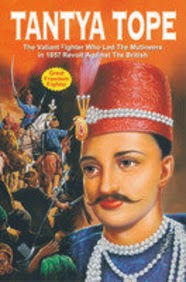 |
| "Tantia Topee's Soldiery" Illustrated London News, 1858 en.wikipedia.org |
 |
| Great patriot Tatya Tope (1814 – 18 April,1859).www.hindujagruti.org |
 |
| Tatya Tope captured in 1859 & hanged to death in April,1859.en.wikipedia.org |
The accepted tradition of legal adoption of son as successor to the throne had been in vogue among the Royal Hindu rulers for several centuries before the arrival of the British. This angered the Hindu rulers who felt the colonial rulers were unnecessarily trespassing on their internal affairs and it was an affront to their regal status and dignity. Now, their legitimate right of legal adoption as a means to resolve the problem of choosing the next heir to the throne was in danger and thus eroding their fundamental rights, their hatred for the British turned into abomination. The aim of the British was to grab the big kingdom under some pretext.
Tatya Tope, now a sworn enemy of the British in 1857 crushed the East India company troops under General Windham stationed at Kanpur by cutting off the supplies of food, water and medicine, etc., which further added to the misery of the British forces. He, with remarkable skill, established Nana Sahib's supremacy and authority which helped the British make a safe passage to Allahabad.Thus, Tope became the Commander-in-Chief of his revolutionary forces. Later Nana Sahib reoccupied Cawnpore (Kanpur) and other places.However, his reoccupation was only brief; the the Second Battle of Cawnpore - November,1857, marking the end of the rebellion in the Cawnpore area.He was defeated by Sir Colin Campbell on December 6.
Later he joined hands with Jhansi Rani Lakshmi Bai in March,1858 and boldly declared Nana Sahib as the Peshwa with the support of the Gwalior forces in spite of protest from the British government. Tatya Tope decided to fight the British tooth and nail and see to it his friend Nana Sahib be installed as the ruler of Gwalior. This ultimately led to the confrontation of British forces led by Gen. Rose against the forces of Tatya with full backing from the forces of Gwalior.The Rani of Jhansi was besieged by British forces. The last battle went in favor of the British, but both Tatya Tope and Jhansi Rani managed to escape. Jhansi Rani,who again made a successful assault on the British forces near Gwalior, finally attained martyrdom at a young age.
After the loss of Gwalior and Jhansi Rani, Tatya Tope launched several guerrilla campaigns against the British and he operated from several places shifting his base from one region to another. He successfully operated in regions like Narmada, Sagar, etc., but had trouble in getting support from local rulers. After his unsuccessful stay in places like Indore, Chandri and Chota Udaipur, he came to the state of Jaipur, where he was camping in the Paron forest. Here he met Man Singh, Raja of Narwar, a trusted friend. The relationship between him and the Raja of Gwalior was very poor. Taking advantage of his relationship with the Gwalior ruler, the British forced Raja Man Singh to betray his friend by revealing his whereabouts. After dodging the British for about a year, under duress, Man Singh at last fell into the trap and became a whistle blower. Tatya Tope was captured by the British forces lead by General Richard John Meade in the Paron forest area where he was camping that too while sleeping.The British court tried him at Shivpuri. He was executed at the gallows on April18,1859.
Tatya Tope gave his life for his close friend Nana Sahib, for Gwalior and for India. Being highly patriotic, he fought against the dishonest, highly corrupt British company and its hegemony till his last breath.Though he made a vain attempt to drive the foxy British out of India, his indomitable spirit to fight for the freedom of India gave inspiration to scores of people in the later years. His total dedication to patriotism was worthy of emulation.
Ref:
1857 - India's Struggle for Freedom - Tantiya Tope". Dec 19, 2014. Retrieved Dec 19, 2014.
http://en.wikipedia.org/wiki/Tatya_Tope






.webp)


